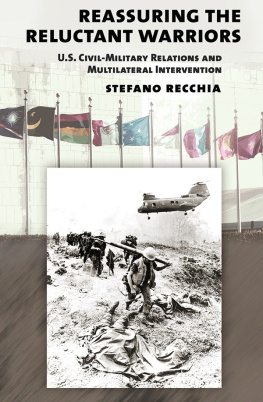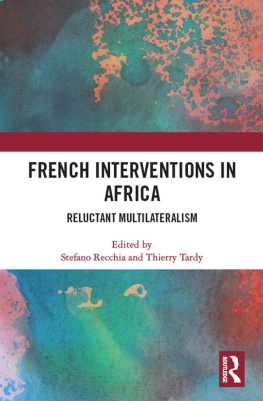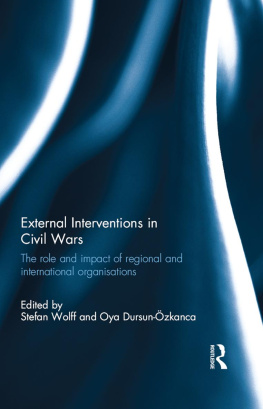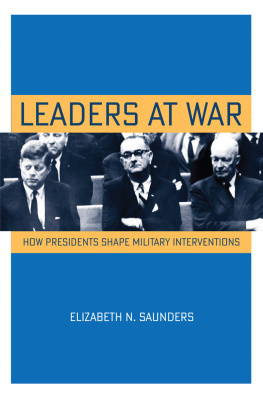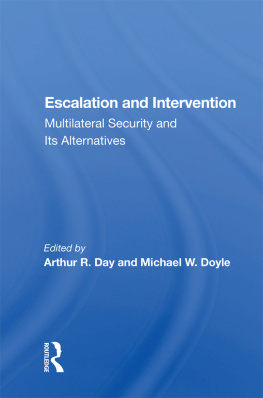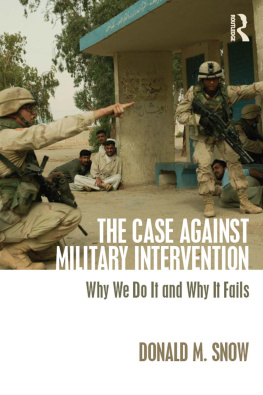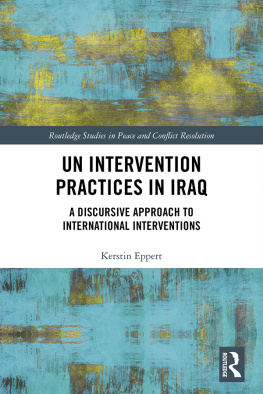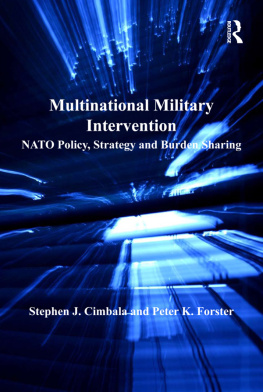Preface
In the summer of 2013, after a chemical weapons attack that killed hundreds of people near the Syrian capital of Damascus, senior U.S. policy-makers, including Secretary of State John Kerry and National Security Adviser Susan Rice, advocated a military response to punish the Syrian regime for its massive human rights violation and tilt the local balance of power against it (DeYoung and Faiola, WashPo , Aug. 31, 2013; Epstein, Politico , Sept. 9, 2013). Kerry and Rice persistently called for military action, even after it became apparent that United Nations or NATO approval would not be forthcoming and that Americas staunchest ally, Great Britain, was unwilling to participate (Erlanger and Castle, NYT, Aug. 29, 2013). However, Americas top-level military leadersnotably the chairman and vice chairman of the Joint Chiefs of Staff (JCS)were opposed to rash unilateral initiatives in pursuit of regime change (Londono, WashPo , Aug. 30, 2013). Admiral James Winnefeld, vice chairman of the JCS, cautioned that merely launching a few Tomahawk Land Attack missiles into Syria hoping to turn the tide of this war will not accomplish that objective. Given the administrations persistent calls that Syrian president Bashar Al-Assad should leave power, he warned, there would most certainly be an appetite for more action, with the result that the United States would most likely be drawn into a protracted conflict, and would need to be prepared for the expense.
President Barack Obama, faced with an administration divided between civilian interventionists and a reluctant military, initially wavered but then quickly ruled out using force to undermine the Syrian regime without a UN mandate, or at least without support from regional multilateral organizations and/or the U.S. Congress (Landler and Gordon, NYT, Aug. 24, 2013; Londono, WashPo , Sept. 1, 2013). In subsequent days, Secretary Kerry fell in line behind the president, and recognizing that UN approval for military action would not be forthcoming, he expressed his cautious support for a peaceful multilateral effort to disarm Syria of its chemical weapons (Gordon, NYT , Sept. 14, 2013). About one year later, General Dempsey and Admiral Winnefeld indicated that they would back limited air strikes against Islamist insurgents in Syria, and in September 2014 the United States launched a targeted bombing campaign (Gordon and Cooper, NYT , Aug. 21, 2014; Whitlock, WashPo , Sept. 23, 2014). But the foreseeable effect of those air strikes was to strengthen rather than undermine the regional status quo and with it the Syrian regimes hold on powerthus making a local power vacuum that might suck U.S. troops into a protracted quagmire less, rather than more, likely.
The Obama administrations behavior toward Syria, I argue, reflects a broader pattern of U.S. military intervention decision making. Americas uniformed leaders usually behave as reluctant warriors in debates about coercive humanitarian missions and other wars of choice aimed at internal political change, emphasizing the risk of protracted peacekeeping and stabilization commitments. As long as U.S. civilian policymakers are divided over how to proceedwhich is likely absent clear threats to American securitythe risk-averse military can tilt the bureaucratic balance of power toward nonintervention. In such circumstances, even heavyweight civilian interventionists (such as Kerry and Rice in 2013) can be expected to recognize the need for United Nations or NATO approvalif only as a means of reassuring the reluctant military about the prospect of sustained burden and risk sharing with international partners, and to ultimately facilitate a presidential decision to intervene.
In the course of working on this book, I have incurred numerous debts to individuals and institutions. Michael Doyle, Tonya Putnam, Dick Betts, and Bob Jervis provided sharp criticism and constructive advice during my doctoral studies at Columbia University. I was very lucky to be advised by such an extraordinary group of scholars, who complemented each other extremely well in their candid feedback on different aspects of the project. Their guidance was invaluable in advancing my research and thinking on U.S. military intervention, multilateralism, and civil-military relations. Michael and Tonya, in particular, have been my leading advocates and professional role models since I entered graduate school in 2005, and I will always be grateful to them for their support.
My research benefited greatly from a fellowship in foreign policy at the Brookings Institution. While at Brookings, I was able to interact with and learn from a number of remarkable individuals, including Michael OHanlon, Martin Indyk, and Bruce Riedel. OHanlon in particular provided helpful, incisive feedback on early draft sections of the manuscript. Being at Brookings also allowed me to gain access to a large number of current and former policymakers whom I interviewed for my projectmore on this below. Subsequently, I developed the project further during a Max Weber fellowship at the European University Institute (EUI) in Florence, Italy. Chris Reus-Smit, my mentor at the EUI, offered valuable guidance and advice.
I also want to thank the roughly one hundred current and former policymakerssenior U.S. officials from the Department of State, the Department of Defense, and the National Security Council (NSC) staff, as well as several European diplomatswho graciously agreed to be interviewed for this project. With the exception of a few individuals who requested to remain anonymous, they are listed by name in the books appendix. Here I would like to thank in particular James Dobbins, Marc Grossman, Steve Hadley, Morton Halperin, John Negroponte, Walt Slocombe, Strobe Talbott, and Generals John Abizaid, Donald Kerrick, Walter Kross, and Gregory Newbold. They were particularly generous with their time and in some cases agreed to be interviewed twice, for more than an hour in each case. Their insights and candid recollections have been crucial to the development of the argument presented in this book.
Furthermore, I am grateful to Rob Seibert, archivist at the Clinton Presidential Library, for advising me on the formalities for submitting several requests for mandatory declassification review of U.S. national security documents. Hundreds of pages of previously classified memos and diplomatic cables have been released pursuant to those requests. Being able to triangulate the evidence from interviews and published memoirs with evidence from declassified documents has been immensely helpful for my research.
The department of politics and international studies at the University of Cambridge provided a wonderfully stimulating and supportive environment for completing the book. Several of my colleagues commented on parts of the manuscript, including Mette Eilstrup-Sangiovanni, Amrita Narlikar, and Aaron Rapport. I also thank Chris Hill, department head during my first two years at Cambridge, for making sure I had the time and resources for research and writing. Two small grants from the Newton Trust and the Philomathia Foundation provided welcome financial support aimed at steering the manuscript toward publication. Viktor Stoll displayed remarkable talents as my editorial assistant.
Working with Cornell University Press has been a rewarding experience throughout. I am grateful to Roger Haydon and the series editors for seeing value in the manuscript and making publication of this book possible. I also thank series editor Steve Walt for his exceptionally detailed and incisive feedback on the draft manuscript, which helped me significantly improve the final version. Karen Laun has been both cheerful and very effective as my production editor, and Jamie Fuller did a superb job as copyeditor.

